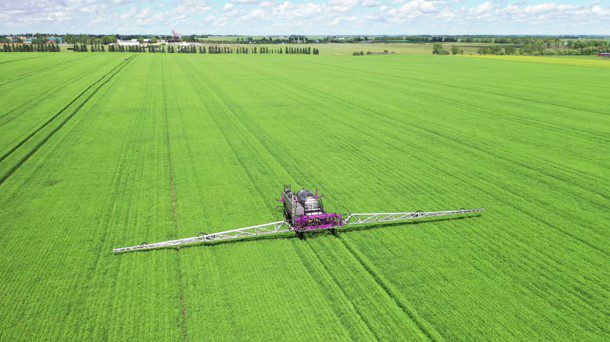
Dr. Joy Agnew, Olds College of Agriculture & Technology’s Vice-President of Research, seems to be a long way from her family farm in rural Saskatchewan. But is she really? Her father was a big believer in early adoption of technology, and would take her with him to agricultural shows around the Prairies. He was constantly educating himself, to which she attributes her love of learning. That thirst for knowledge propelled her to earn a bachelor’s degree and a doctorate, both in Agricultural Engineering, from the University of Saskatchewan, as well as an MSc focused on composting science from the University of Alberta. While finishing her PhD, she did some teaching, which opened her eyes to the enjoyment of sharing knowledge with students and exposing them to new possibilities and opportunities. Nevertheless, she realized early on that her primary passion remained applied research, and her subsequent career choices reflect that focus, particularly her current role, which has her leading three CAAIN-supported projects, including one called Evaluation and Improvement of Autonomous Agricultural Equipment for Broad-Acre Crop Production. It’s all about validation, demonstration, and return on investment of AgTech adoption. So really, her career choices have led her to come full circle—she is on a farm evaluating the latest technology.
“What I love about my position,” she explains, “Is that I get the best of both worlds. I work hands-on with fantastic researchers, teachers, and students. I’m engaged in research while supporting the teaching and training of the next generation. This is my dream job.”
Modern agriculture is evolving rapidly. Industry is constantly introducing digital and autonomous technologies to improve crop and livestock production by increasing efficiencies and optimizing resource consumption, thereby reducing waste and enhancing agri-food sustainability. Automating broad-acre crop production offers real potential, while simultaneously presenting technical hurdles that must be overcome before farmers will consider adopting the new equipment.
Raven Industries’ OMNiPOWER™ Platform, a Canadian robotic farm technology whose development CAAIN is also supporting, functions as an automated seeder, sprayer, spreader, and fertilizer applicator. In 2020, Olds College purchased a unit to support the development of autonomous agricultural equipment and validate its viability in Western Canadian agronomic conditions.
“One of the really cool elements of this project,” says Dr. Agnew, “Is that we are operating the autonomous technology side by side with conventional equipment to compare the two approaches. According to the manufacturer, the data we’ve generated has been very helpful in improving their platform. In fact, Raven have repeatedly complimented our work. That’s a true testament to the excellence of our team and the validity of our approach.”
The project partners have operated the OMNiPOWER™ Platform on more than 10,000 acres through the 2020, 2021, and 2022 growing seasons. This has generated valuable, robust data on field, fuel, and labour efficiency substantiated by real-world application, and the initiative has been so successful that talks are under way to expand the program and possibly have two autonomous vehicles operating simultaneously. In addition to the data generated regarding the efficiency of the equipment, the team is working with Raven’s engineers on evaluating and improving the OMNiPOWER perception system, which allows the implement to recognize and avoid obstacles.
Another important benefit the Olds College projects provide is the hands-on learning available to students. Every year one or two are offered an on-site work placement focused on using the Raven equipment. As a result, they become experts with this advanced autonomous vehicle technology. But more than that, all the school’s Agriculture and Agronomy students are exposed to activities that build their understanding of, and comfort with, the latest AgTech. That provides them a significant advantage when they graduate. In fact, this kind of education is good for the entire agri-food industry because the agronomists and farm operators who have enjoyed such practical training will evolve to become the leaders of tomorrow on whom we will depend to propel Canadian agriculture to the levels of efficiency required to feed a growing global population.
When asked what it is about the project that gives her the most pride, Dr. Agnew considers her response carefully. “Hmmm…I guess there are a couple of things. First, there’s the capacity we’re building with respect to the expertise necessary to operate the autonomous vehicle effectively. That includes the training we’re providing students. Then there’s the fact that Raven’s engineers have reached out to compliment us on the way we measure the efficiency of their equipment. They were so impressed that they would like to publish with us. I can’t lie. That made us all feel pretty good about the work we’re doing. Our goal is to validate and demonstrate emergent technologies, and it’s gratifying when those results in turn validate our methodologies.”
Joy says that CAAIN’s support has been essential. “Without that funding, we couldn’t operate our smart farm at the level we do. And without that capacity and sophistication, the Raven project simply would not be possible because we would lack the resources needed to make it work. So really when you ask what CAAIN’s support has meant, I can summarize the value with one word: ‘Everything!’”
CAAIN Contribution
$1,104,000
Total Project Value
$3,935,711
Project Contact
Joy Agnew, PhD
Vice-President, Research
Olds College of Agriculture & Technology
jagnew@oldscollege.ca
Project Video